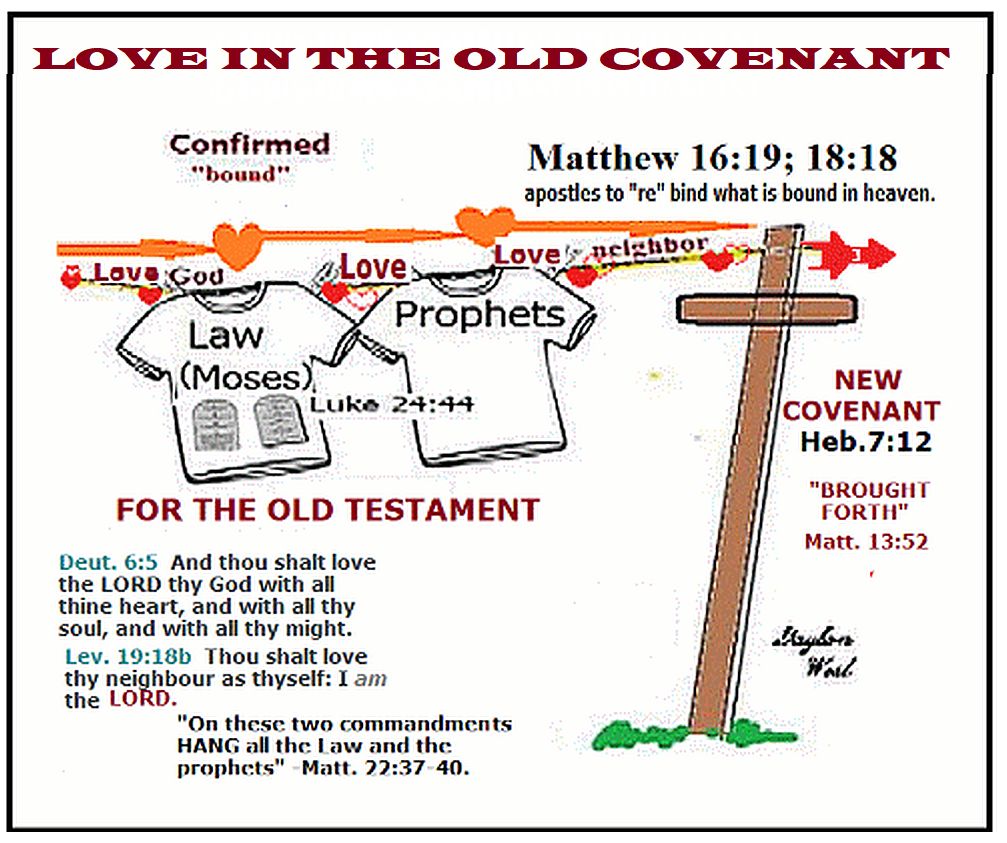
REMEMBERING
HANGING THE WASH OUT TO DRY FOR MOTHER AND THE FAMILY.
It is unfortunate that theologians on the subject of marriage have biased opinions on what Jesus wanted for marriage and divorce. For example, some will claim that Jesus "forbade" divorce. Therefore, they conclude that "Jesus presumes to teach that what the Law of Moses "permitted" and/or commanded and regulated was actually the sin of adultery."i Jesus is not teaching this error; the theologians are. In the passage in the "sermon on the mount" He specifically gives an exception for one to "put away a wife" just as Moses did in Deuteronomy 24:1-4. Sensible students agree with this; they have a problem with whether Jesus is giving the same exception as Moses did.
They will then either try and harmonize their interpretations of Jesus' teaching with the apostle Paul or completely ignore Paul's writings. The fact is, Paul's teachings were exclusively under the New Covenant whereas Jesus, on the other hand, during His earthly ministry was dealing with repentance toward the "Old Covenant" (i.e., the Law of Moses) prior to its termination on the cross (Ephesians 2:15-17).
Matthew 4:17, “From that time Jesus began to preach, and to say, Repent: for the kingdom of heaven is at hand.” The word "repent", according to Thayer's
Greek Definitons, is "to change one's mind for better, heartily to amend with abhorrence of one's past sins." "Sin" is transgression of the law. 1 John 3:4, “Whosoever committeth sin transgresseth also the law:
for sin is the transgression of the law.” The audience were sinner Jews. What law had they violated? Was it not the Law of Moses (OT)? Jesus' testament was not in force for them to violate. He had to die first (Hebrews 9:16).
A. "YOU HAVE HEARD IT SAID" versus "IT IS WRITTEN"
When Jesus was directly quoting the Law, He would say, "It is written", as He did to the devil during the wilderness temptations (Matthew 4:1ff; Luke 4:1ff). Or, as He answered the lawyer (Luke 10:26), "He said unto him, What is written in the law? how readest thou?" When the lawyer quoted the Old Testament passage as written, Jesus commented, "Thou hast answered right: this do, and thou shalt live."
Consequently, since Jesus used the expression, "You have heard" in Matthew 5, was He not referring to how the Pharisees taught the people, which was called in Hebrew 'שמעתא' "hearing"? The hearings were the connotations and/or traditions added by the Pharisees.ii Commentators (such as McGarvey, Jamieson +, Barnes, and Clarke) agree that Jesus was especially addressing the "glosses" iii that were added to the readings. Later, after the temple had been destroyed in 70 A.D., the Pharisees supposedly had their traditions written down in the Talmud. The sections in the Talmud begin with the words, "Come and hear."iv
When we compare the Law with what is quoted by Jesus, such an interpretation can be seen as true. For example, with verse 43, "hate thine enemy" is added to the "love" passage commanded in the Law. This is not in the Mosaic passage. The Pharisees may have been interpreting Deuteronomy 32:41 or Numbers 10:35 in connection with verse 43. Such passages, however, when read are actually referring to the hatred of their enemies toward Israel. The Pharisees were in error.
This is affirmed in Matthew 5:21. "Ye have heard that it was said by them of old time" (Matthew 5:21). This was also a Talmud expression; that is, as here, "by them of old time", or "to the ancients." The expression is not speaking of Moses or anyone of the inspired prophets, but to the interpreters, the "ancient" teachers before Jesus but since the days of Ezra. These "ancients" had corrupted the Law of Moses by their false glosses which they recited to the people.v
"Here Jesus quotes the Jewish oral teaching current in his day."vi It is reasonable then to believe that Jesus was correcting or clarifying what interpretation and connotation the teachers had left in the "hearing" with the people. This included teaching on marriage and divorce. Jesus is definitely not censuring Moses.
B. "BUT I SAY UNTO YOU"
During the "sermon on the mount" Jesus would state a subject “It has been said” and then follow it up with His commandment, “But I say unto you” (Matthew 5). He did this in this sermon with “putting away” (verse 32). The observation is made when He concludes the sermon on the mount: "And it came to pass, when Jesus had ended these sayings, the people were astonished at his teaching: For he taught them as [one] having authority, and not as the scribes" (Matthew 7:28, 29, ESV2011).
Why were the people "struck" with amazement because of how Jesus taught as compared to how they were accustomed to being taught by the scribes (and Pharisees)? Was it not because of the Pharisees' method of appealing to the "oral interpretations" of the sages, while Jesus affirmed His corrections with "I say unto you."
Remember Jesus was careful to point out that He was not attacking the Law of Moses since He prefaced His words with, "Think not that I am come to destroy the law, or the prophets: I am not come to destroy, but to fulfil" (Matthew 5:18).
See Book Marriages Designed In Heaven, XI.31 "I AM NOT COME TO DESTROY."
Jesus was born under the Law of Moses (Galatians 4:4) and He did not violate any of it (Hebrews 4:15; 5:8,9). He did not teach against it. Jesus was sinless Himself with the Law. He did not teach his disciples or audience to disobey it, which as we have pointed out, would have made Him worthy of death (Deuteronomy 13:1).
Jesus taught the Law in the sermon on the mount. "Therefore if thou bring thy gift to the altar, and there rememberest that thy brother hath ought against thee; Leave there thy gift before the altar, and go thy way; first be reconciled to thy brother, and then come and offer thy gift" (Matthew 5:23,24). There is no thusiasterionG2379 ("altar; place of sacrifice") under the New Covenant. The temple would be destroyed in just a few years just as Jesus prophesied (Matthew 24:1,2) and Christians would not and could not have an altar of sacrifice (Matthew 24:2). This makes it clear that Jesus is talking about the Law of God delivered to the Jews only in the sermon on the mount.
It is the opinion of some that God's moral codes continue in Jesus' law but on a much higher and consequential scale (Galatians 6: 2, Romans13, John 15: 12, Hebrews 10: 25 ff.). It is easy to agree with this position in reading the "Sermon on the Mount"; however, when we look closer to the context of Jesus versus the Pharisees, we can appreciate that Jesus is really clarifying the essence of the teachings of Moses and the Prophets and urging the people to repent.
C. MORAL RULES CONFIRMED BY JESUS
It is a sound argument, I believe, that the reference that Jesus made to His not destroying the Law also assured His listeners that what He is saying does not mean that He wants them to break the Law of Moses which they were under. He would not have told those living in anticipation of His kingdom and during his ministry that they should disobey any of the Law. It cannot be overstated. Jesus was not Moses' enemy.
Jesus confirms, for example, the Old Testament teaching on loving God and loving one's neighbor (Deuteronomy 5:10; Deuteronomy 6:5; Leviticus 19:18, 34; Matthew 19:18,19; 22:37, 39).* The "Law and the Prophets" hang on these two commands.vii Which law? The Law that came by Moses (John 1:17). The Old Testament. I have heard plenty "sermons" on Jesus' teaching of "love God" and "love your neighbor." This is Jesus' teaching. But as He points out, He, the Son of God, had given that teaching through the Law of Moses and His Old Covenant prophets.
* "And shewing mercy unto thousands of them that love me and keep my commandments" (Deuteronomy 5:10; cf. 7:9).
"And thou shalt love the LORD thy God with all thine heart, and with all thy soul, and with all thy might" (Deuteronomy 6:5; cf. 10:12; 11:1,13; 13:3; 30:6,16,20).
"Thou shalt not avenge, nor bear any grudge against the children of thy people, but thou shalt love thy neighbour as thyself: I [am] the LORD" (Leviticus 19:18).
"[But] the stranger that dwelleth with you shall be unto you as one born among you, and thou shalt love him as thyself; for ye were strangers in the land of Egypt: I [am] the LORD your God" (Leviticus 19:34; cf. Deuteronomy 10:18,19).
D. THE "CLOTHES LINE" OF GOD
Jesus said, "On these two commandments ("love God" and "love neighbor") hang all the law and the prophets" (i.e., Old Testament, Matthew 22:40). "For all the law* is fulfilled in one word, [even] in this; Thou shalt love thy neighbour as thyself" (Galatians 5:14). *The only law in effect that Jesus could refer to was the Law of Moses!
That was the Old Testament. Now, let's go to the New Covenant of Jesus revealed to us through His inspired apostles. "For this, Thou shalt not commit adultery, Thou shalt not kill, Thou shalt not steal, Thou shalt not bear false witness, Thou shalt not covet; and if there be any other commandment, it is briefly comprehended in this saying, namely, Thou shalt love thy neighbour as thyself" (Romans 13:9). This portion of the Ten Commandments is reconfirmed then by the Holy Spirit through the apostles for the New Testament of Jesus Christ. "Love thy neighbor" is not something new and presented by Jesus as modern false teachers claim.
"The Golden Rule." Those that would demean Christianity will try and show that Jesus' teachings were not original but predated Him by centuries in Far Eastern religions. One that is taunted is the so-called "golden rule." Along with other ancient religious leaders and philosophers, such as Aristotle, Confucius is quoted as preceding Jesus with something similar to the "golden rule": "How about 'shu' [reciprocity]: never impose on others what you would not choose for yourself?" Confucius is dated around 551–479 years before Jesus. His is a negative statement "do not unto others" and often is called the "silver rule." "Kidder notes that this concept's framework appears prominently in many religions, including 'Hinduism, Buddhism, Taoism, Zoroastrianism, and the rest of the world's major religions.'"viii
Now Jesus never claimed to have formulated such a "new" rule during His earthly ministry. Jesus said that this "golden rule" came from Moses and the Prophets. That would predate even Confucius about 1000 years. "Therefore all things whatsoever ye would that men should do to you, do ye even so to them: for this is the law and the prophets" (Matthew 7:12). Ultimately, of course it did come from Jesus who is one of the Godhead (John 1:1-3; 1 Corinthians 10:4) who taught Moses and those that preceded him from the beginning of creation.
-
From a portion of a chapter from my book: Marriages
Designed In Heaven
sold on Amazon; etc.
https://www.biblestudylessons.net/books/books.html.
GAYLON WEST
THROW OUT THE LIFELINE website
i Quotes Meier. http://daviddflowers.com/tag/shammai/
ii John Gill's Exposition of the Entire Bible
iii gloss.-"an explanation or addition to the Biblical text." wikipedia.org.
iv http://www.myjewishlearning.com/blog/rabbis-without-borders/2013/08/28/hillel-and-shammai. Accessed 8/19/14.
v John Gill's Exposition of the Entire Bible. "Matthew 5:21."
vi Exegesis of Matthew 5:32-33 and Matthew 19:3-9 By Gerhold L. Lemke
[Prepared for the Dakota-Montana District, Eastern Conference, Fall Pastoral Conference, November 6-7,
1973.]
vii “Law and Prophets” equals “Moses and the Prophets” (Luke 16:29,31) taught by Jesus in the parable of the rich man and Lazarus.

